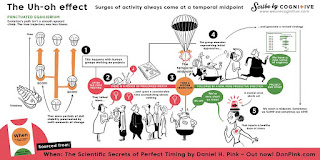Daniel Pink (renown author of "Drive" - and the surprising truth about what motivates us https://www.youtube.com/watch?v=u6XAPnuFjJc where we learned that throwing money at people doesn't help, autonomy, mastery and purpose do)... He has recently shifted his focus to the importance of timing, including a book called "When". An interesting data/fact/research driven conclusion is that people are highly effected by temporal events like in 'mid life crisis' or running more marathons at 29, 39 or 49 years old are motivated by midpoints and endpoints. Having short sprints in Scrum (say 2 weeks) forces people to focus and prioritize on delivery, not on some unattainable long term obscure vision, but a concrete step in the right direction of accomplishing that vision. Scrum, once again, leverages human strength and has 'built in' to the system behavior that leverages human strength, not human weakness. The more research emerges about how h...
